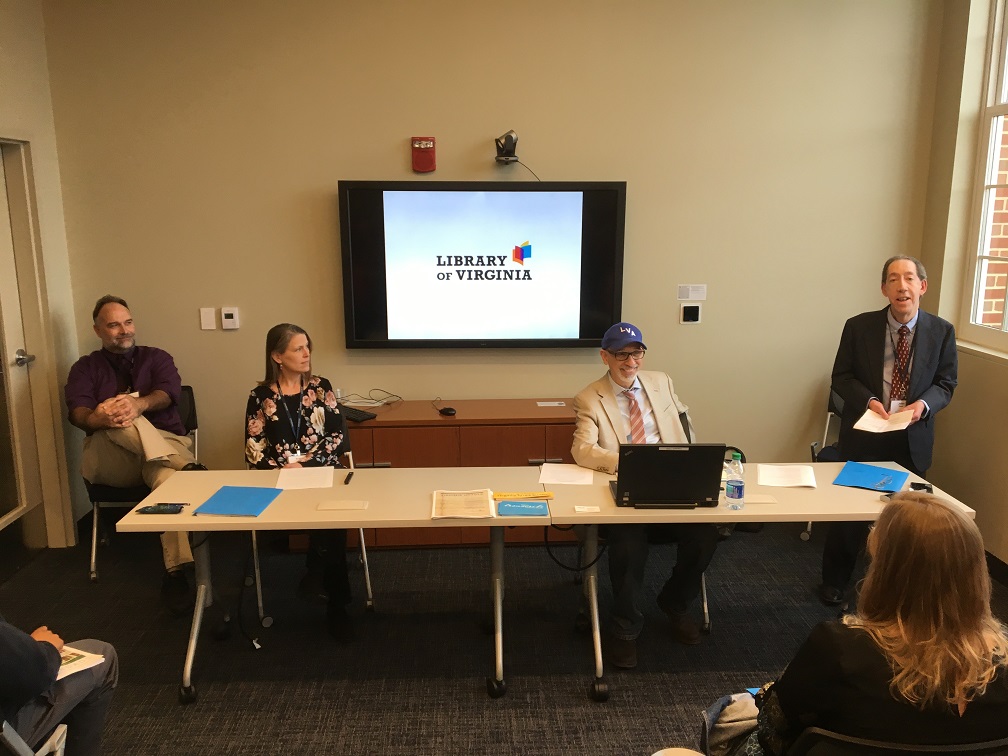Virginia Untold: African American Narratives at the Library of Virginia
Earlier this month, the 14th annual Virginia Forum convened at Longwood University in Farmville, VA. The three-day event was packed with presentations, learned papers, and lively discussions related to Virginia history.
The theme of this year’s Forum was “Crossroads,” which, as the program notes, is both a figurative and literal term as it relates to Farmville, the town where Longwood University is located.
Three colleagues from the Library of VA, Tracy Harter, Errol Somay, and Greg Crawford, teamed up to create an engaging session titled, VA Untold: African American Narratives at the Library of Virginia. In the photograph below you will see, from left to right, Greg Crawford, Tracy Harter, Errol Somay, and our moderator, John Deal (Also from the Library of Virginia).

The Journey of the Sixty-Six from Prince Edward County to Liberia, Tracy Harter, Senior Local Records Archivist
Researchers use a variety of resources to get to the truth of a matter, or to gain a better understanding of a story’s complexities. Manuscript collections, newspapers, maps, census records, military records, and other more familiar sources come to mind for this purpose, but the Circuit Court Records at the Library of Virginia provide invaluable detail that cannot be found in other sources—or detail that can help corroborate (or dispute) other sources. The Circuit Court Records Preservation Program at the Library of Virginia strives to provide researchers access to these records.
To demonstrate the value of Circuit Court Records, Tracy’s talk drew from two Prince Edward County chancery causes[i] and from the Dupuy Family Papers 1810-1866, a collection of private papers housed at the Library of Virginia. The individual sources seemed to tell three different stories; however, when Tracy studied them together, she was able to reveal the long and convoluted story of 66 slaves emancipated by the will of their owner on condition that they relocate to Liberia, and the efforts of his executors to distribute the funds remaining from his estate to them. Through her exhaustive research, the audience gained a keen understanding of the richness of local government collections for academic research.

The Virginia Newspaper Project and the Freedom on the Move, Collaboration Errol Somay, Director, Virginia Newspaper Project
Errol Somay discussed the Virginia Newspaper Project’s contribution to Freedom on the Move (FOTM), a project to aggregate runaway slave advertisements using digitized newspapers. The VNP estimates that VA imprint newspapers hold thousands of ads related to slaves seeking their freedom.
Errol explained both the technical process for aggregating large data sets of fugitive slave ads and the crowdsourcing component of FOTM.
An engaged group of citizen historians will be able to break down every element of these deceptively simple ads by plugging in detailed information into a searchable database, which will be available to all users.
Errol also pointed out that the fugitive slave notifications published in Virginia newspapers, along with archival records housed at the Library of Virginia, open new avenues for research – by delving into the combined resources of newspapers and archival records, a more complete story will emerge.
Finally, Errol reported that the recent National Endowment for the Humanities grant applications sought to focus Virginia’s digitization efforts on antebellum and Civil War era newspapers, which no doubt will assist in the FOTM’s efforts in identifying as many fugitive slave ads as possible.
Greg Crawford, Local Records Program Manager, titled his talk Runaway, Condemned, Transported: A Story of Slavery as Told by the Auditor of Public Accounts.
During the antebellum period, the General Assembly passed increasingly restrictive laws in response to white fears of crime and insurrection by enslaved people. Procedures were established to compensate slave holders for the loss of their property when enslaved people ran away or were imprisoned or executed. Unclaimed runaway slaves were sold at public auction with the net proceeds sent to the Auditor of Public Accounts.
In his talk, Greg used the Library’s Auditor of Public Accounts (APA) paper trail to show how profits from runaway slave sales funded the education of white children. As Greg told it, the myriad types of records found in the APA collection illuminate the sordid role Virginia’s state government played in the story of slavery.

The three talks at this session of the Virginia Forum demonstrate how different records—a “crossroads” of records, sticking to the theme of the program—help create a more detailed picture of Virginia’s untold stories. We hope that researchers delve into all of these of records at the Library of Virginia to help tell those stories.
Team Virginia Newspaper Project attended a number of interesting sessions but afterwards we took time to take in a quick view of Longwood University and Farmville. Despite the intermittent rain and the overcast skies, the day gave way to sun and we found the town charming with a variety of things to do, though we didn’t have quite enough time to hunt for hand knotted imported rugs!







